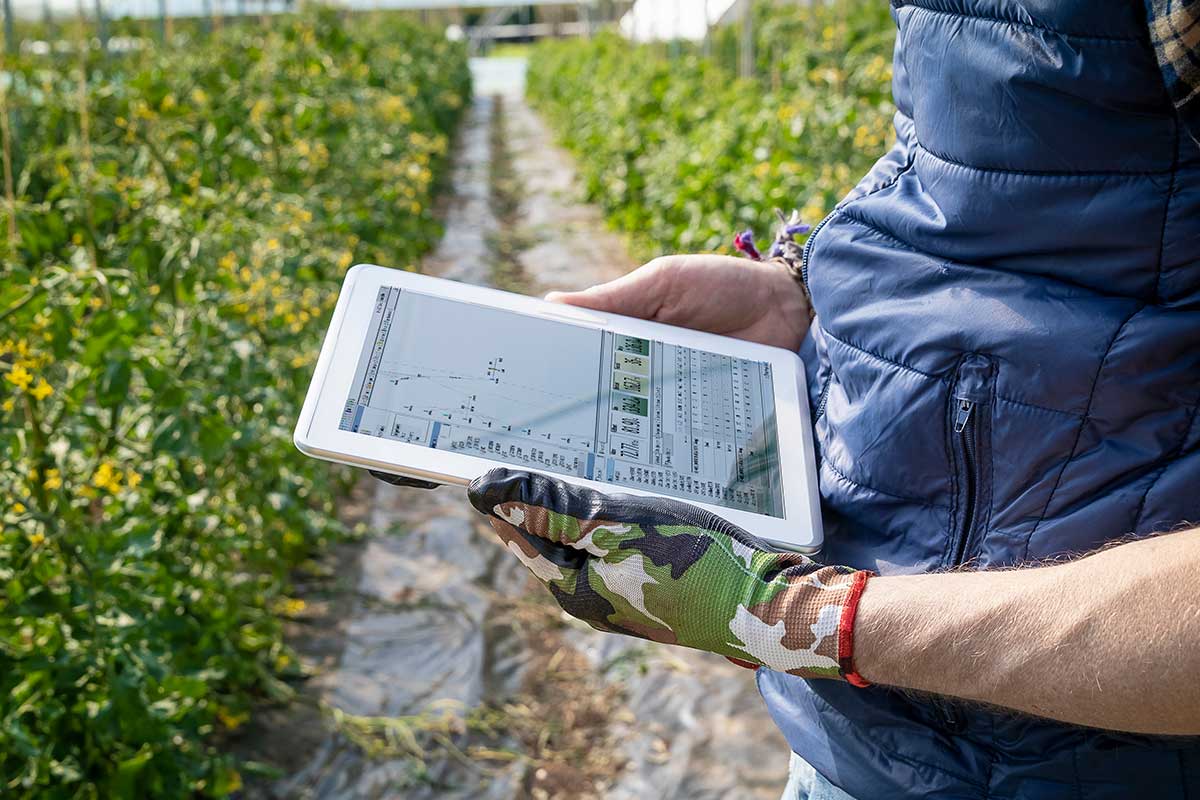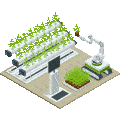Curbing Food Waste With Sustainable Production
Produce and deliver exactly what consumers want, with the least resources, through sustainable production methods on a single platform.
Produce and deliver exactly what consumers want, with the least resources, through sustainable production methods on a single platform.
The food waste crisis has reached a critical point. According to the UN Environment Program’s Food Waste Index, 923 million metric tonnes of food1 is wasted globally every year, contributing up to 10 percent of greenhouse gas emissions. The UN’s International Day of Awareness of Food Loss and Waste calls both the public and private sector to work towards restoring resilient food systems2.
In a world plagued by excessive consumption and overproduction, reducing food waste is a shared responsibility between food companies, retailers and consumers. Reducing food waste requires collective responsibility and action from food producers, retailers, and consumers alike. While food waste is often seen as a consumer-level problem, it permeates every stage of the food supply chain, from farm to fork. Addressing this systemic issue requires identifying its root causes and implementing sustainable solutions at each step.
Food is lost before it even reaches consumers due to poor production planning, inefficient logistics, and lack of supply chain visibility. For example:
- Crops left unharvested: Many crops remain in fields because of market fluctuations or overproduction estimates. Farmers, wary of a surplus that may drive prices down, leave harvests to rot rather than sell at unsustainable prices.
- Spoilage during transport: Weak or inadequate infrastructure, such as improper storage, lack of refrigeration, and prolonged transit times, causes food to spoil before reaching its destination. This is especially prevalent in perishable food categories like fruits, vegetables, and dairy.
- Retail-level waste: Retailers contribute significantly to food waste through excessive inventory, aesthetic standards, and unclear package labeling. Products close to "best before" or "use by" dates are often removed from shelves, even though they are still perfectly edible. Misunderstood labeling confuses consumers and fosters unnecessary discards.
- Consumer level: Food waste arises from over-purchasing, improper storage, and misunderstanding of expiration dates. Many individuals throw away food prematurely, influenced by misconceptions about safety and quality. This excessive waste not only impacts households economically but also exacerbates environmental damage by unnecessarily utilizing natural resources and contributing to landfill methane emissions.
Why Food Waste Reduction is Crucial for Sustainability
- Environmental Impact: Reducing food waste significantly lowers greenhouse gas emissions, conserves water, and reduces land degradation.
- Economic Benefits: Globally, food waste represents a $1 trillion loss annually. Tackling it can improve profitability for businesses and lower costs for consumers.
- Food Security: With millions suffering from hunger, reducing food waste can help redistribute resources more equitably.
- Climate Action: Addressing food waste aligns with the UN Sustainable Development Goal 12.3, which aims to halve per capita food waste by 2030.
How to Control Food Wastage?
Controlling food wastage requires a multi-faceted approach involving individuals, businesses, and governments. Here are key strategies to reduce food wastage effectively:
1. Improve Food Storage and Handling
- Use temperature-controlled storage and transport systems to reduce spoilage in the supply chain.
- Educate consumers on proper food storage techniques (e.g., refrigeration, freezing, and proper use of containers) to extend shelf life.
- Implement smart packaging solutions that indicate food freshness and minimize waste.
2. Promote Efficient Production and Supply Chain Management
- Plan Production Based on Demand: Utilize predictive analytics and market forecasts to align production volumes with consumer demand, avoiding overproduction.
- Optimize Supply Chains: Implement IoT-based monitoring and real-time logistics management to improve food transport conditions.
- Adopt Circular Economy Practices: Repurpose surplus food for donation, animal feed, or bioenergy production.
3. Reduce Waste at the Retail Level
- Simplify Food Labeling: Use clear, standardized labels like "best before" and "use by" dates to avoid consumer confusion.
- Implement Discounts on Near-Expiry Products: Offer discounts on items close to their expiration to ensure they are consumed rather than discarded.
- Accept Imperfect Produce: Encourage retailers and consumers to purchase fruits and vegetables that don’t meet aesthetic standards but remain perfectly edible.
4. Educate Consumers and Encourage Mindful Eating
- Buy What You Need: Plan meals and shopping lists to avoid over-purchasing.
- Store Food Properly: Teach consumers how to store perishable items like fruits, vegetables, and dairy correctly.
- Repurpose Leftovers: Promote zero-waste cooking techniques and recipes that use leftovers or food scraps.
- Understand Expiry Labels: Educate consumers on the difference between "best before" (quality) and "use by" (safety).
5. Policy and Collaboration
- Encourage governments to establish food waste reduction policies, such as incentives for food donations and penalties for excessive waste.
- Foster partnerships between businesses, NGOs, and food banks to redistribute surplus food to those in need.
- Launch public awareness campaigns to emphasize the environmental, social, and economic impacts of food waste.
Sustainable Development Goal for Food Waste
The United Nations Sustainable Development Goals (SDGs) comprise a comprehensive framework encompassing 17 goals and 169 specific targets, all slated for achievement by the year 2030. Among these goals, there is a distinct objective to 'Eradicate hunger, achieve food security, improve nutrition, and promote sustainable agriculture.' Embedded within this goal are specific targets aimed at diminishing food losses and waste throughout the entire food value chain by 2030.
This underscores the pivotal role of reducing food waste in advancing the cause of sustainable development, given its significant implications for:
- food security,
- natural resources,
- the mitigation of climate change,
- greenhouse gas emissions.
So, how can companies solve the food waste crisis and save the environment? The answer lies in sustainable production where companies can build resilient food systems with the least resources.
However, challenges remain. Companies are under pressure to adapt to supply volatility and demand-driven shifts, innovate at scale and develop more sustainable products — all at great speed. To address these challenges and succeed in sustainable production, companies need a high level of agility.
The key to unlocking agility is through end-to-end digital transformation with the 3DEXPERIENCE® platform — providing visibility into the supply chain, lab, packaging design process, production and supply chain.
Innovate Faster, Smarter and More Sustainably
- Improve agility
- Produce sustainably
- Build resilient food systems
The Digitalized Approach to Food Waste Reduction
With a data-driven platform, companies can help reduce the scale of the global food waste crisis through the three ways below.
1. Real-Time Consumer Insights
Companies are looking at consumer behavior patterns to determine the next big trends in the market. What’s the consumer sentiment surrounding the processing of food waste into other products? Gaining real-time insights through the 3DEXPERIENCE platform will help market leaders stay competitive and better prepare for the right amount of food production.

2. End-to-end Supply Chain Transparency
By creating greater transparency throughout food supply chains with Dassault Systèmes’ DELMIA solutions, companies can identify where the wastage happens and solve the problem at the source.
With DELMIA solutions, you can:
- Leverage forecasts and market intelligence to manufacture with less waste
- Plan and optimize virtually to reduce environmental impact without compromising production
- Collaborate with all stakeholders across the ecosystem including partners, suppliers and customers
- Have full visibility and control over the entire supply chain
- Utilize logistics planning to optimize distribution and enable reverse logistics
- Measure a range of sustainability KPIs including CO2 emissions, amount of waste generated and recyclability rates
3. Digitalized Sustainable Production
Explore how Dassault Systèmes’ solutions, powered by the 3DEXPERIENCE platform, can help companies in:
Next-generation food science
Explore new combinations of ingredients and understand their performance at a molecular level to manufacture delectable plant-based alternative proteins.
Reformulation and recipe management
Reformulate, simulate, test and validate recipes with local, healthier ingredients that allow for shorter innovation cycles.
Sustainable ingredient sourcing
Compare the impact of alternative sourcing options on the supply chain to respond to changing weather conditions and ingredient price swings.
Eco-efficient packaging design
Create and validate packaging designs with materials that are recyclable, biodegradable and supportive of a circular packaging economy.
1Source: “Food waste: Amount thrown away totals 900 million tonnes” by BBC (March 2021)
2Source: “International Day of Awareness on Food Loss and Waste Reduction” by United Nations
FAQ About Wasting Food & Climate Change
Food loss and waste pose significant challenges to global sustainability, presenting a pressing issue that affects the environment, consumers, and the efficient use of natural resources. Approximately one-third of the world's food production is squandered each year, leading to concerns about its environmental impact, including greenhouse gas emissions and the broader issue of climate change. This wastefulness not only strains our planet's resources, such as land and water, but also exacerbates air pollution.
Moreover, the economic ramifications of this food loss are substantial, with an estimated annual loss of $1 trillion in valuable food resources. Addressing the impacts of food waste is crucial, not only for the sustainable management of food production but also for taking meaningful actions to combat climate change and promote responsible consumption.
Minimizing food waste plays a pivotal role in fostering a sustainable global ecosystem. There exists a multitude of avenues through which food waste can be curtailed, encompassing mindful consumer choices, adept food storage practices, and the efficient utilization of leftovers.
By implementing these straightforward adjustments, individuals can actively participate in diminishing food waste, thereby contributing to the promotion of a sustainable lifestyle and mitigating the deleterious impacts of food waste on natural resources, climate change, and greenhouse gas emissions.
A multitude of strategies are at our disposal to bolster food sustainability, encompassing the reduction of food waste, the adoption of environmentally-friendly farming techniques, and the promotion of local food producers. Taking these actions is vital to combat the impacts of food waste on natural resources, climate change, and greenhouse gas emissions while ensuring the enduring sustainability of food production.
As the global population continues its growth trajectory, the quest for sustainable approaches to food production and consumption has assumed paramount significance. Food waste emerges as a pivotal challenge in the context of food production sustainability, with far-reaching consequences. Not only does it deplete the available food supply, but it also exerts a significant environmental toll.
Annually, more than one-third of all food produced is lost, squandering the resources and energy invested in its production. By mitigating food waste, we can ameliorate the environmental repercussions of food production and play a pivotal role in securing a sustainable future.
The United Nations Sustainable Development Goals (SDGs) comprise a comprehensive framework encompassing 17 goals and 169 specific targets, all slated for achievement by the year 2030. Among these goals, there is a distinct objective to 'Eradicate hunger, achieve food security, improve nutrition, and promote sustainable agriculture.' Embedded within this goal are specific targets aimed at diminishing food losses and waste throughout the entire food value chain by 2030.
This underscores the pivotal role of reducing food waste in advancing the cause of sustainable development, given its significant implications for:
- food security,
- natural resources,
- the mitigation of climate change,
- greenhouse gas emissions.
Food scraps encompass those often discarded components of our meals, including:
- vegetable peels,
- bones,
- eggshells,
- meat trimmings,
- and other forms of food waste.
These often-overlooked portions contain valuable nutrients, vitamins, and minerals that would typically go to waste. Furthermore, many of these food scraps can be repurposed or recycled, offering a promising avenue toward building a more sustainable food system.
This approach has the potential to mitigate the environmental impacts of food waste, contributing to the preservation of natural resources and the fight against climate change and greenhouse gas emissions.
Related Content with Food Waste Environmental Impact
Circular Economy
How circular economy practices can help your business dare to be bold through new business models that preserve the environment for future generations.
Food & Beverage
Accelerate growth and meet consumer demand for ‘healthier’ while driving sustainability initiatives and regulatory compliance for maximum efficiency.
Food & Beverage Manufacturing
Achieve unmatched visibility, synchronization and control of global food & beverage production.
Better Waste Reduction
Digitalization keeps waste-reduced products in the loop and unlocks long-term revenue streams in the transition towards the circular economy.



